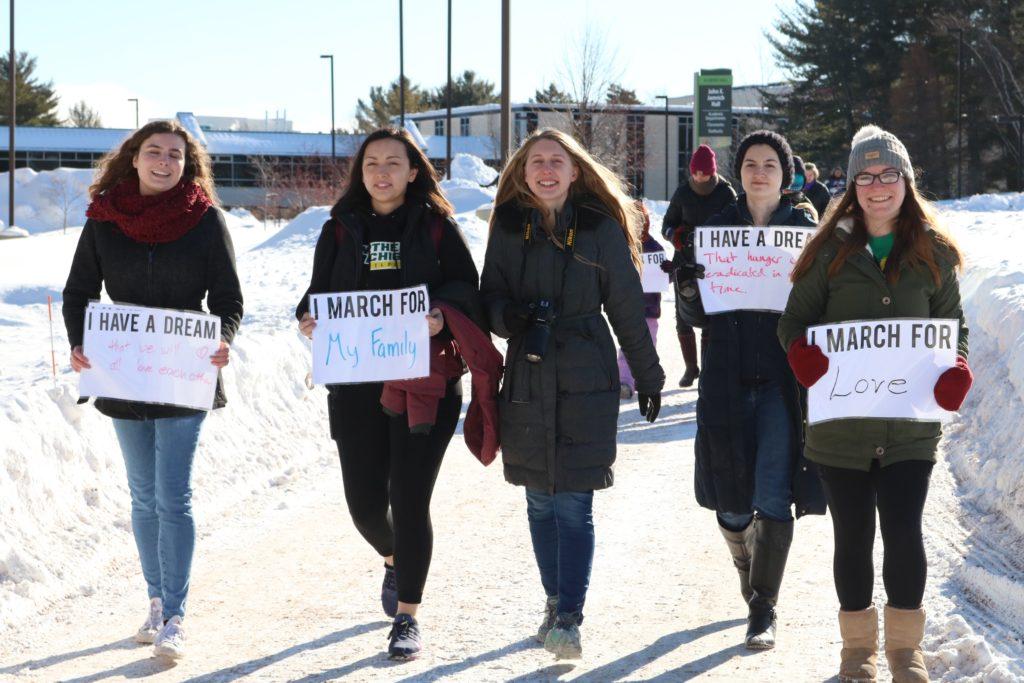Through snow, slush, ice and sand—the cold crisp air didn’t discourage over 20 students, faculty and community members from marching for equity through the Academic Mall on Monday.
The march kicked off a full day of events honoring the legacy and work of civil rights icon Rev. Martin Luther King Jr.
Participants gathered in The Woods Lodge to hear a variety of different works read, from creative to question posing. NMU President Fritz Erickson explained in his opening statement that he would prefer to read from King to continue the spirit of importance and historical remembrance during the march. Erickson chose to recite a section of the “How Long, Not Long” speech King spoke while marching from Selma to Montgomery.
“I come to say to you this afternoon, however difficult the moment, however frustrating the hour, it will not be long, because truth crushed to the Earth will rise again,” Erickson said. “How long? Not long, because no lie can live forever. How long? Not long, because you reap what you sow. How long? Not long.”
While the march and readings have become tradition for NMU in celebrating MLK Day, this year offered a small yet distinct change in intent. Rather than marching for equality, this year’s focus also brought in equity.
NMU Diversity and Inclusion Officer Jessica Cruz explained that while the two are similar, there are more technical aspects to ensuring equity that can give equality a more solid foundation.
“Equality is the concept of treating everyone the same and equity takes fairness into consideration,” Cruz said. “Equality assumes that everyone is starting at the same point, equity does not. If you really want to create equality and opportunity, then you have to address the systemic issues that are in the way.”
This small move holds a large significance for the university moving forward, Cruz explained.
“Just having the march and calling for a focus on equity, I think shows intentionality and that we’re working to move the needle,” Cruz said. “Moving beyond equality and toward equity we have to acknowledge the historical context. When you get to discuss things like equity you begin to do that.”
Lesley Larkin, associate professor in the English department, continued the discussion of history by bringing up examples on how King’s work made such a large impact on the African American authors of the time—specifically Toni Morrison. Larkin told a story about conversations between Morrison and King’s eldest son Martin Luther King III after King’s assasination. When asked if there was anything she wanted to know from the late leader, Morrison simply expressed her hope that he wasn’t disappointed in her.
“Morrison—prodigious author and nobel laureate—possessed of unmatched moral intellectual gravitas suppressing her wish to please her hero,” Larkin said. “Her worry that we haven’t moved far along enough toward justice on the long arch of the moral universe, but also that she personally hadn’t done enough to enact King’s mission.”
Pushing focus more toward King’s views on education, assistant social work professor LaMart Hightower read passages from an article King wrote while a student at Morehouse College in 1947 titled “The Purpose of Education.” Hightower used the article to start a larger conversation about implementing King’s views at NMU.
“King understood the importance of education in advancing the positions of minorities and eliminating long social prejudices. We need an actual conversation about equality, equity and tolerance,” Hightower said. “My question for NMU is this, are we having an honest conversation about race, gender, LGBTQIA+ and other issues that divide us, or are we afraid to leave our comfort zone?”
Following Hightower’s call to action, nine different poets presented their work in a variety of different languages ranging from German, Spanish or Finnish as a part of Poetry Without Borders, which is an event hosted by the languages, literature and international studies department to celebrate cultures. In the spirit of MLK many of these poems talked about the struggle for civil rights in different cultures. However, some also served as a way to showcase the beauty in simple things.
Such a diverse selection of language is something that junior English writing major Katie Buhrmann found musical while also reflecting the same poetic style that King become so known and loved for.
“I swear he is a poet first and foremost and I love looking at anything he has spoken because it has a rhythm to it,” Buhrmann said. “I think it’s so interesting to hear other languages spoken because you get that rhythm.”
Assistant Professor of language, literature and international studies Anna Zimmer has worked to bring Poetry Without Borders as a part of the MLK celebration. Zimmer explains that having such a good turnout despite the time of year speaks to the power of a message that has stood the test of time.
“On a cold day, it’s great to see all those people come out. I think it’s really great to share these words with anyone willing to hear them and listen,” Zimmer said. “ In many ways, it speaks to the fact that King’s words are universal.”
As the listeners disbursed to take part in a service project of their choice, the air held a collective sense of understanding and urgency for everyone to change something about the world they live in.
























